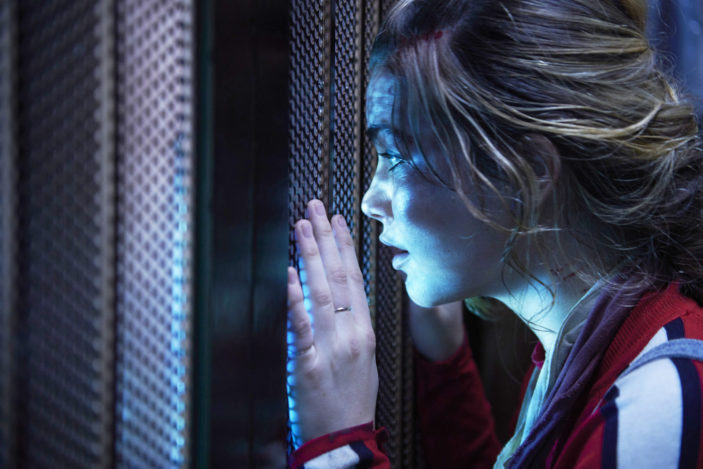
Ascendant is one of those films that’s equally as difficult to write about it as it is deceptively simple. A film that banks entirely on the fact that it unravels and reveals its narrative in an unexpected manner, Antaine Furlong‘s ambitious sci-fi-leaning action/thriller is a testament to the first time Australian filmmaker’s bold vision and wily intelligence to pull such a feat off.
The elevator pitch premise of a young woman trapped in an elevator (the irony), some 120 floors up, is one that we’ve seen utilised before in a variable of manners; the attempted infiltration of Jodie Foster’s safe haven dwelling in Panic Room, Ryan Reynolds’ underground coffin claustrophobia in Buried, and the core basis of the Saw franchise all being prime examples. Here though, Furlong has taken this singular setting and transformed it with a mentality that brings to mind more supernaturally inclined plotting, something that infinitely elevates the thesis.
Initially a one woman show surrounding young environmentalist Aria Wolf (Charlotte Best, wholly committing herself to the role with an emotional tenacity that brings to mind the likes of such talent as Florence Pugh), Ascendant wastes no time in throwing its audience into the thick of the intensity. Awaking in an elevator – slightly technologically advanced in its design to suggest a near-future setting – with no recollection of how she got there, the film immediately earns emotional investment from its audience as she’s pushed to the physical and psychological edge of her supposed limitations with the elevator violently descending in its contained shaft at any given moment.
It’s because Aria isn’t sure of just how she got there but who she is in general in regards to her past that gives Ascendant its emotional edge. Furlong’s script – a collaboration with Kieron Holland – utilises this narrative trope and forces Aria to confront what she thought she forgot, allowing the singular setting of the elevator to open itself up to its fullest potential by introducing a duo of characters linked to uncovering who she truly is; Jonny Pasvolsky and Alex Menglet, as her father and her foe, respectively, interacting with her through a surveillance camera further leans in to Furlong’s creativity as to how to lend an expansive mentality to a claustrophobic-feeling production.
Aria’s past is where the film adopts its more supernatural inclinations, and though it could feel wildly uneven in relation to its initial set-up – even though her being trapped in this particularly-designed elevator is heightened as is – it somehow rather organically blends into proceedings. The boldness of this narrative means Ascendant‘s intention to be the jumping point of a trilogy of stories could make this particular outing feel unfinished, but even if we are denied further tellings – and given Australia’s current penchant for rewarding locally made films with sizeable monetary returns, it would be a shame if this undaunted effort was overlooked – Furlong closes out the film with a type of definitiveness that laces satisfaction along its open ending temperament.
A film that harnesses its strength through its ability to surprise, both in its story and its psychology, Ascendant‘s intricate effects – some of the digital renderings are stunning – and faithful performances – Menglet indulges in the villainy of his character, whilst Best offsets his theatricality with bare conviction – keep it from succumbing under its own ambition. A further attestation to what Australian filmmakers can achieve if provided faith in their visions, Ascendant should be the starting point for both Furlong as a storyteller and as a film series that delights in its futurism appeal.
![]()
![]()
![]()
![]()
![]()
THREE AND A HALF STARS (OUT OF FIVE)
Ascendant is screening in Australian theatres from April 8th, 2021.
